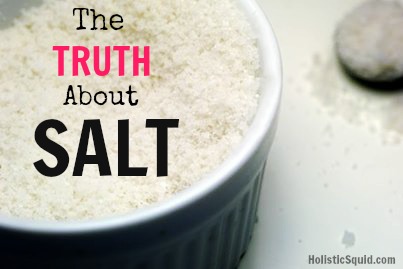
I've always loved salt. Back in the day, this meant white powder pouring onto fast food french fries. Now, older, a tad wiser, and possessing more refined taste buds, I've found salt that's both delicious and healthy. Did you know that salt is essential for health?
What? Healthy salt?
Yes, that's right. Salt (in its minimally processed, high quality form) may not deserve all the evil slashings it receives.
Out in the mainstream, there's a lot of confusing misinformation about salt consumption. On the one hand, we're told we need the iodine in “iodized” table salt to promote thyroid health and proper functioning. On the other hand, we're told to avoid consuming too much salt as it can cause high blood pressure, fluid retention and other health problems.
Most health conscious folks try to avoid it as much as possible, while fine chefs know that salt is an essential component to optimizing taste. So, what's the shake?
Salt is essential to life; without it we die. We are equipped with salt taste buds, and we need salt for protein and carbohydrate digestion, adrenal function, cellular metabolism and brain development.
Unrefined salt provides us with many trace minerals that are also essential to life. Most of the soil that grows our fruits and vegetables (even organic) is mineral poor, so a pinch of rich salt provides our bodies with minerals it requires.
The facts about salt studies
Salt has been considered a valuable and useful substance for thousands of years by cultures throughout the world. How is it possible that what's traditionally been considered a healthy and helpful substance could suddenly prove so threatening?
While there are plenty of studies to support low-sodium diet claims, the fact is that there are plenty of studies that prove the opposite.
Research by epidemiologist Michael Alderman stresses it isn't in everyone's best interest to eat a low sodium diet to control blood pressure, and doing so may actually even do more harm than good for many people. After an extensive study, Alderman found that patients who consumed the LEAST sodium had the MOST cardiovascular complications and myocardial infarctions.
While some individuals who are “salt sensitive” may benefit from restricting sodium intake, the long term health complications and negative side effects of going low-salt are more likely to be problematic for the general population.
The Weston A. Price Foundation has compiled extensive historical and cultural evidence suggesting that the culprit in poor cardiovascular health and other “sodium” related issues is in fact tied to the onslaught of processed foods. Their book, Nourishing Traditions, contains a wealth of information and wisdom regarding food choices and preparation for optimal nutrition.
Commercial vs. natural salt
To understand the truth about salt, the first thing you need to know is that commercial, table salt (in most salt shakers and packaged foods) is NOT the type of natural salt our bodies need for good health.
Commercial salt is sodium chloride, a chemical that is made by processing natural salt at high temperatures which changes the molecular structure and strips other vital minerals that salt naturally contains.
Commercial salt also contains additives such as anti-caking agents, iodine, and even sugar. Because it's not in its natural form, salt as pure sodium chloride is excessive and the body must work to excrete it. Table salt therefore, creates a heavy burden for the body, and excess consumption can certainly contribute to health problems including high blood pressure, heart disease, kidney disease, and fluid retention.
Because of the widespread use and abuse of processed salt, we have been told for years to avoid salt all together. Following this advice can lead to even more problems. We are all salty on the inside – our blood, sweat, tears, and even our urine contain salts.
It's important to replenish the minerals in our bodies, but using the right salt is key. The best way to put salt back into your body is to use high mineral content, minimally processed salts.
Choosing the right salt is essential
When choosing your salt, do it consciously. “Sea salt” that looks and tastes like Morton's iodized salt probably isn't much better for your body than the junk food salt.
Look for salt that contains other minerals, is not snow white and uniform, and doesn't create a burning sensation when placed on your tongue. High quality salt shouldn't leave you feeling bloated or thirsty either. Two great options:
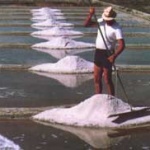 Celtic sea salt (traditionally hand-harvested from the pristine coast of Brittany, France) contains over 80 minerals from the sea. The mineral content in Celtic sea salt is optimal for maintaining proper fluid balance and utilization in the body. It also normalizes blood pressure, enhances digestion, and nourishes the adrenal glands. Celtic sea salt is available at many natural food stores. It costs more than commercial salt, but it's a small price to pay for a grand investment in your health. Celtic sea salt is also delicious, so your taste buds will be happy too. This is what we use in our home and you can get it here.
Celtic sea salt (traditionally hand-harvested from the pristine coast of Brittany, France) contains over 80 minerals from the sea. The mineral content in Celtic sea salt is optimal for maintaining proper fluid balance and utilization in the body. It also normalizes blood pressure, enhances digestion, and nourishes the adrenal glands. Celtic sea salt is available at many natural food stores. It costs more than commercial salt, but it's a small price to pay for a grand investment in your health. Celtic sea salt is also delicious, so your taste buds will be happy too. This is what we use in our home and you can get it here.
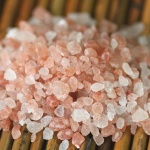 Himalayan salt is another option. This surprisingly pink salt extracted from the Himalayas is said to contain all 84 elements found in our bodies and important trace minerals. Mined and hand-washed, this salt is purported as a more pure alternative to sea salt. Get it using this link. Do a taste test to discover for yourself what tastes best and feels best in your body.
Himalayan salt is another option. This surprisingly pink salt extracted from the Himalayas is said to contain all 84 elements found in our bodies and important trace minerals. Mined and hand-washed, this salt is purported as a more pure alternative to sea salt. Get it using this link. Do a taste test to discover for yourself what tastes best and feels best in your body.
Sea salt tips
Drink it – For an inexpensive alternative to sugary electrolyte drinks like Vitamin Water and Gatorade, try adding a pinch of sea salt and a squeeze of lemon to your water anytime including for better absorption on hot days, when working out, or when recovering from illness.
Give it to baby – Though the common advice is to not salt baby's food before the age of two, high quality sea salt is completely safe for babies and young children. In fact, a pinch of good salt on their food will provide baby with much needed micro-minerals and help them to digest proteins and carbohydrates.
Be bold – Dump out your salt shaker and replace it with a pinch bowl of your new, healthy salt. Add it to your dishes with confidence, rather than caution, knowing you are adding flavor and vitality to your food and your body. When out and about, either BYO salt or use conventional salt with moderation.
Click here my favorite sea salt



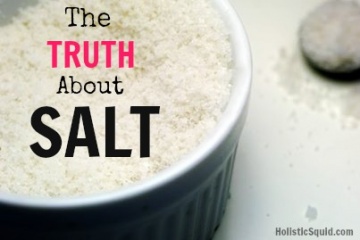
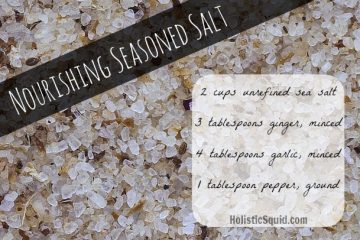



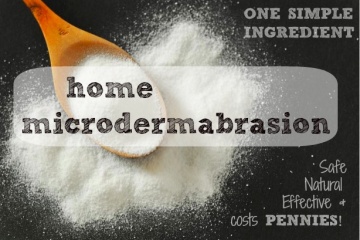


Nice summary. I’m surprised that you left Redmond’s Real salt out of your lineup of healthy options. Is there something about it that you find less than ideal?
I wonder that as well. I would think it would be closely related to the Himalayan salts, but I could be wrong.
I’ve recently switched from iodized salt to natural sea salt and Himalayan pink salts but I’m worried about an Iodine deficiency … I eat a really varied diet of whole foods, almost nothing processed and tons of green veggies, eggs and some seaweed and fish but try to mostly follow a vegetarian diet (some meals vegan). Do you ever worry about Iodine deficiency, or can you recommend the best/easiest sources to include Iodine into our diets? Thanks!
I don’t. Here’s a thorough article on the topic of iodine:
http://www.westonaprice.org/metabolic-disorders/the-great-iodine-debate
I was worried about that, too; I’m new to Real Food. And then I did a little googling and found out there are plenty of other ways to get iodine, namely seaweed. I also found out that the reason they started adding iodine to salt, a commonly eaten food, is because of poor soil in some parts of the country. So instead of improving the health of the soil, they did this and now so many of us suffer from hypothyroid issues because we’ve taken in too much iodine. (This can also happen from too little iodine.) So if you’re a person who buys from farmers that pay attention to the health of their soil, or if you do so and grow it yourself, you’re probably safe. I personally like to eat (wild caught alaskan) fish and baked potatoes with the skin (peruvian blue ftw!!) so yeah, I’m probably good, too. Also, thank you Emily for this website! I’m learning so much and am so excited for my Real Food lifestyle!!
Thanks Karen! I’m glad it is helping 🙂
as you talk about the idea of salt’s notoriety for increasing blood pressure, I think back to something I used to stress to my biochemistry and nutrition students- that it is partly a consequence of osmosis. other substances such as sugar also have osmotic effects and given the amount of sugar and yes additives in the typical modern diet, it’s no wonder high blood pressure is so endemic in the modern processed culture. the interesting thing about all the trace minerals in Himalayan pink salt is that these minerals carry charges around in the body and serve as batteries for proper enzyme function and protein folding. chronic micronutrient deficiencies lead to dramatically decreased quality of life and pre-mature aging. kudos to you for the great article.
Great post, it worries me how many people are scared to eat salt! We eat himalayan salt. Just wondering if you can elaborate on the changes to molecular structure when salt is refined. Going back to high school chemistry, sodium chloride is an ionic salt, there’s not much you can change, I would have thought. Refining simply removes the other minerals from the natural salt, doesn’t it?
Hi Farmer Liz, thanks for the question. You’re quite right. Refining the salt removes all the other valuable minerals that are already there. A small amount of Iodine is also normally added along with anti-caking and conditioning agents to increase shelf life.
I see that the Celtic Sea Salt folks sell a “fine” version of their salt and even a shaker. Do you find these to be the same quality as the course version?
Hi JS – Thanks for the comment. As long as it is still unrefined, the only difference would be the grind, since coarse salt usually has to be ground down in order for it to evenly distribute when cooking or baking with it.
My husband read and also heard on a Podcast (not sure of author or podcaster, sorry! but it was on 2 separate occasions) that Himalayan salt is all a big scam. I have tried to google this and some articles do come up but now I am unsure of what to believe, I know there is so much misinformation out there and many people who will embellish on the truth to make a sale.
Do you have any thoughts or info on this?
Personally I love the taste of Himalayan salt but after hearing this my husband wants me to stop wasting our money on it.
Our family been switching over to the sea salt and intrigued by the Himalayan one. I will be looking for some to add to our pantry. There are some foods I won’t eat without salt (watermelon for one), and I think it is genetic. My 18 month rarely ate store bought baby food, and we believe it is because they were all salt free products. My wife ended up adding salt to the package so he would eat.